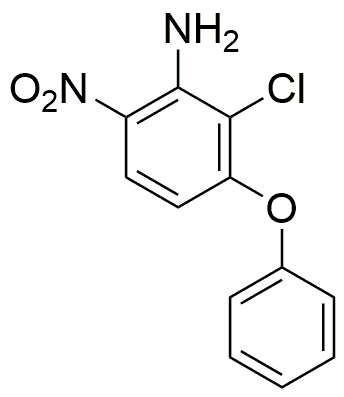Aclonifen is widely utilized in research focused on:
- Agriculture: Aclonifen serves as a selective herbicide, effectively controlling a variety of broadleaf weeds in crops like soybeans and peanuts, enhancing crop yield and quality.
- Environmental Science: Researchers study its environmental impact and degradation pathways, providing insights into sustainable agricultural practices and minimizing chemical runoff.
- Phytotoxicity Studies: It is used to evaluate the phytotoxic effects on non-target plants, helping in the development of safer herbicide formulations.
- Analytical Chemistry: Aclonifen is employed in residue analysis to monitor its presence in food products, ensuring compliance with safety regulations.
- Formulation Development: It aids in the formulation of new herbicides with improved efficacy and reduced environmental impact, addressing the challenges of weed resistance.
Informations générales
Propriétés
Sécurité et réglementation
Applications
Aclonifen is widely utilized in research focused on:
- Agriculture: Aclonifen serves as a selective herbicide, effectively controlling a variety of broadleaf weeds in crops like soybeans and peanuts, enhancing crop yield and quality.
- Environmental Science: Researchers study its environmental impact and degradation pathways, providing insights into sustainable agricultural practices and minimizing chemical runoff.
- Phytotoxicity Studies: It is used to evaluate the phytotoxic effects on non-target plants, helping in the development of safer herbicide formulations.
- Analytical Chemistry: Aclonifen is employed in residue analysis to monitor its presence in food products, ensuring compliance with safety regulations.
- Formulation Development: It aids in the formulation of new herbicides with improved efficacy and reduced environmental impact, addressing the challenges of weed resistance.
Documents
Fiches de données de sécurité (FDS)
La FDS fournit des informations de sécurité complètes sur la manipulation, le stockage et l’élimination du produit.
Spécifications du produit (PS)
Le PS fournit une description complète des propriétés du produit, notamment sa composition chimique, son état physique, sa pureté et les exigences de stockage. Il détaille également les plages de qualité acceptables et les applications prévues du produit.
Certificats d'analyse (COA)
Recherchez des certificats d'analyse (COA) en saisissant le numéro de lot du produit. Les numéros de lot et de lot se trouvent sur l'étiquette d'un produit, après les mots « Lot » ou « Lot de fabrication ».
Numéro de catalogue
Numéro de lot/série
Certificats d'origine (COO)
Ce certificat d'exploitation confirme le pays dans lequel le produit a été fabriqué, et détaille également les matériaux et composants utilisés et s'il est issu de sources naturelles, synthétiques ou autres sources spécifiques. Ce certificat peut être requis pour les douanes, le commerce et la conformité réglementaire.
Numéro de catalogue
Numéro de lot/série
Fiches de données de sécurité (FDS)
La FDS fournit des informations de sécurité complètes sur la manipulation, le stockage et l’élimination du produit.
DownloadSpécifications du produit (PS)
Le PS fournit une description complète des propriétés du produit, notamment sa composition chimique, son état physique, sa pureté et les exigences de stockage. Il détaille également les plages de qualité acceptables et les applications prévues du produit.
DownloadCertificats d'analyse (COA)
Recherchez des certificats d'analyse (COA) en saisissant le numéro de lot du produit. Les numéros de lot et de lot se trouvent sur l'étiquette d'un produit, après les mots « Lot » ou « Lot de fabrication ».
Numéro de catalogue
Numéro de lot/série
Certificats d'origine (COO)
Ce certificat d'exploitation confirme le pays dans lequel le produit a été fabriqué, et détaille également les matériaux et composants utilisés et s'il est issu de sources naturelles, synthétiques ou autres sources spécifiques. Ce certificat peut être requis pour les douanes, le commerce et la conformité réglementaire.


